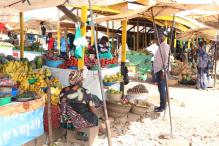New research published today by the UNU World Institute for Development Economics Research (UNU-WIDER) warns that the economic fallout from the global pandemic could increase global poverty by as much as half a billion people, or 8% of the total human population. This would be the first time that poverty has increased globally in thirty years, since 1990.
The authors of the UNU-WIDER study - Andy Sumner and Eduardo Ortiz-Juarez of King’s College London and Chris Hoy from Australian National University - find that a setback of this size would reverse a decade of global progress on poverty reduction.
This study shows that the achievement of the 2030 Agenda, and in particular, the SDGs on no poverty and zero hunger, is under considerable threat. The need of the hour is to bring together development agencies, national governments, civil society and the private sector in a global effort to protect the livelihoods and lives of the poorest of the poor in the Global South.
– Kunal Sen, Director of UNU-WIDER.
The results of the study have galvanized concern for vulnerable communities around the world. They are being cited by Oxfam International, today, in its call to world leaders to implement “an Economic Rescue Plan for All, to keep poor countries and poor communities afloat,” ahead of key meetings of the World Bank and International Monetary Fund (IMF) and G20 Finance Ministers’ next week.
Oxfam is calling on world leaders to agree on an Emergency Rescue Package of 2.5 trillion USD paid for through the immediate cancellation or postponement of 1 trillion in debt repayments, a 1 trillion increase in IMF Special Drawing Rights (international financial reserves), and an additional 500 billion in aid.
The WIDER Working Paper estimates an outcome of a 400-600 million persons increase in global poverty given a scenario in which per capita consumption contracts by 20%. The study also estimates poverty increases for mitigated contractions of 10% and 5% and shows the impacts on poverty by region, as well as globally.
Andy Sumner, Professor of International Development at King’s College London and a Senior Non-Resident Research Fellow at UNU-WIDER, said of the research:
“We were surprised at the sheer scale of the potential poverty tsunami that could follow COVID-19 in developing countries. Our findings point towards the importance of a dramatic expansion of social safety nets in developing countries as soon as possible and - more broadly - much greater attention to the impact of COVID in developing countries and what the international community can do to help”.
Media Contact
Timothy Shipp, UNU-WIDER Communications Associate, shipp@wider.unu.edu




